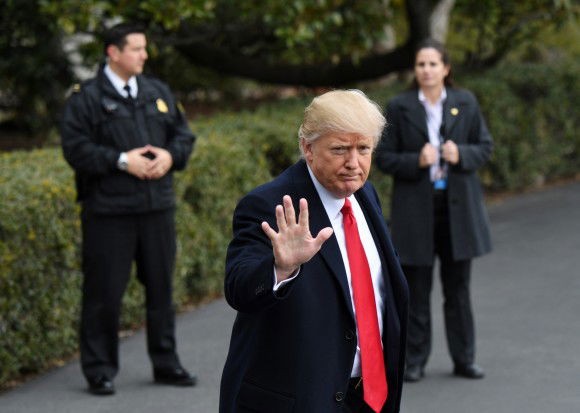Headlines
President Trump's new executive order bans travel from six countries

Washington, March 6
US President Donald Trump on Monday signed a revised version of his executive order on immigration, that places a 90-day ban on people from six predominantly Muslim nations.
The new order, which excludes Iraq from the original list of seven countries, will go into effect from March 16. The executive order bars citizens from Sudan, Syria, Iran, Libya, Somalia and Yemen from entering America for 90 days.
President Trump signed the new order behind closed doors around 11:30 a.m., NBC reported.
Iraq was removed from the list after assurances from the Iraqi government of increased information sharing with the US, a senior Department of Homeland Security official told reporters on Monday.
Visas revoked because of the original travel ban have been fully restored, according to the State Department.
"To our allies and partners around the word, please understand this order is part of our ongoing efforts to eliminate vulnerabilities that radical Islamic terrorists can and will exploit for destructive ends," Secretary of State Rex Tillerson said after the executive order's signing.
Tillerson, Homeland Security Secretary John Kelly and Attorney General Jeff Sessions unveiled the order in front of reporters.
The directive includes a 120-day ban on all refugees.
A three-judge panel from the Ninth US Circuit Court of Appeals had in early February ruled unanimously to uphold a federal judge's restraining order on the travel ban, delaying the executive order's implementation.
Kelly said the US needed a "rigorous review" of visa and refugee programmes. "We cannot risk the prospect of malevolent actors using our immigration system to take American lives," he said.
The earlier order had sparked chaos at airports around the world as airlines refused to let passengers with visas on to flights bound for the US.
The new ban, which takes effect March 16, halts travel for 90 days for residents of Iran, Libya, Somalia, Sudan, Syria and Yemen. The refugee suspension will last 120 days.
Iraq, whose citizens and nationals had been on the original list of banned travelers, was removed after officials there agreed to accept all Iraqi citizens being deported from the U.S., according to a senior official at the Department of Homeland Security who briefed reporters on the latest plan.
That was one of several changes to the order designed to insulate it from court challenges that blocked the first one. The new order also leaves more time for agencies to implement it in hopes of alleviating the confusion that accompanied the original order, which was issued only a week after Trump took office, with little consultation from top agency officials.
The new ban also clarifies that permanent residents and those holding valid visas will be allowed to enter the country or remain here. The order will give the Department of State room for exceptions “on a case-by-case basis when in the national interest of the United States,†according to Homeland Security.
Trump signed the order privately Monday morning with little fanfare, and the White House announced it only afterward.
The newest order will have sweeping effects, slowing the refugee program to a trickle and creating a new immigration standard for the six countries effected. But it falls short of the all-out ban on Muslims that Trump promised during the campaign.
Unlike the earlier directive, the new instructions do not suspend Syrian refugee admissions indefinitely. Syrian refugees are included in the blanket suspension and are not singled out.
The new order, while not freezing all asylum seekers, would still repeat language in the old order that would slow their entry dramatically, by capping the program at 50,000 refugees for the year, compared with 110,000 allowed under policies of the Obama administration. The U.S. has already accepted 35,000 refugees this year, meaning only 15,000 more would be allowed.
In addition to blocking visas from the six listed countries, the new orders require agencies to "take immediate steps" to create "enhanced vetting and screening procedures" for all foreigners wanting to visit the U.S., the senior Homeland Security official said. "The president is very concerned about existing vulnerabilities," the official said.
After the new order is implemented next week, Homeland Security and State Department officials will examine every country in the world to ensure they are providing the U.S. enough information to vet their citizens appropriately, a Homeland Security official said. This review period could also be used as leverage to force countries to take back people that the U.S. would like to deport, the official said.
There is also no waiver for religious minorities in the new temporary refugee ban.
Trump also said in an interview with the Christian Broadcasting Network on the day the first order was issued that it was intended to help Christian Syrians.
To read the executive order, please visit the White House: https://www.whitehouse.gov/the-press-office/2017/03/06/executive-order-protecting-nation-foreign-terrorist-entry-united-states



































